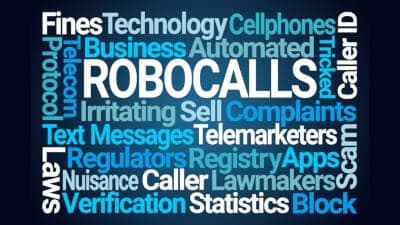FCC issues robocall cease and desist letters
The FCC Enforcement Bureau recently sent cease and desist letters to six voice service providers for transmitting illegal robocalls.
The letters went to the following companies:
- Icon Global Services, Brentford, UK
- IDT Corporation, Newark NJ, USA
- RSCom, Aurora ON, Canada
- Stratics Networks, Hamilton ON, Canada
- Third Rock, Vancouver BC, Canada
- Yodel Tech, Washington UT, USA
Required actions
In these letters dated March 17, 2021, the Commission advised these companies of the actions they should take:
- Investigate the identified traffic.
- Effectively mitigate the identified traffic.
- Implement safeguards to prevent customers from using their network to originate illegal robocalls.
- Within 48 hours, inform the Commission and the Traceback Consortium of the steps taken to mitigate the identified traffic.
- Within 14 days, inform the Commission and the Traceback Consortium of the steps taken to prevent customers from using the carriers’ networks to transmit illegal robocalls.
Consequences of failure are severe
The Enforcement Bureau identified the consequences for failure to comply:
- If the carriers continue to route the identified robocalls after 48 hours, then downstream U.S.-based voice service providers may begin blocking all calls from the providers.
- If the carriers fail to take sufficient robocall mitigation actions to prevent their networks from being used to transmit illegal robocalls, then downstream U.S.-based providers may block their calls following notice to the Commission.
Profiles of illegal robocalls
Among these six carriers, the letters listed 244 robocall incidents. A sample of recent robocalls includes:
- Apple support and iCloud support imposter
- Social Security Administration imposter
- Attempted Telephone Denial of Service (TDoS) attacks
- Credit card rate reduction fraud
- COVID-19
- Utility imposter
- Student loan fraud
- Health insurance fraud
- Auto warranty fraud

Implications
We can draw a few clear conclusions from these letters:
- The FCC is continuing to press voice service providers for robocall transit, as we saw in 2020.
- As then, the Commission is giving providers 48 hours to stop the identified traffic, else downstream providers may block their calls.
- Something new: The Commission is now requiring these providers to implement an effective robocall mitigation program.
- This stronger approach to robocall mitigation was established in the Third Report and Order, which the Commission adopted on July 16, 2020.
Now we see it in action.
Robocall mitigation
With the Third Report and Order, it’s no longer sufficient to respond to identified robocall originators. If the Enforcement Bureau contacts you about illegal robocalls in your network, you will also be given 14 days to explain how you’re going to mitigate future illegal robocalls in general.
How would you do that?
TransNexus can help:
- We offer a comprehensive suite of robocall mitigation solutions in our ClearIP and NexOSS software platforms.
- We can help you identify and deploy the methods that would be most appropriate for your circumstances.
- We can help you fast-track your Robocall Mitigation Certification filing based upon the methods you choose.
Contact us today to learn how to put effective robocall mitigation in place.
TransNexus has a comprehensive suite of robocall mitigation solutions to prevent the origination of unlawful robocalls.
Learn more about robocall mitigation